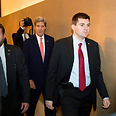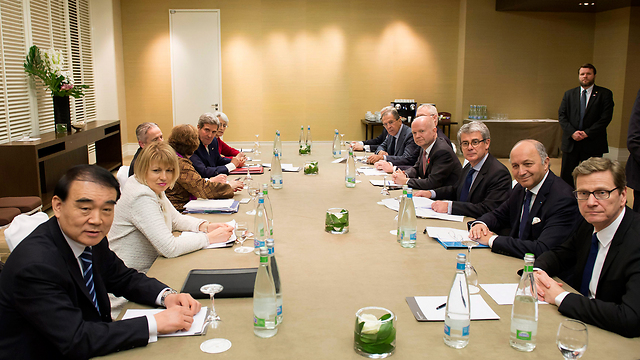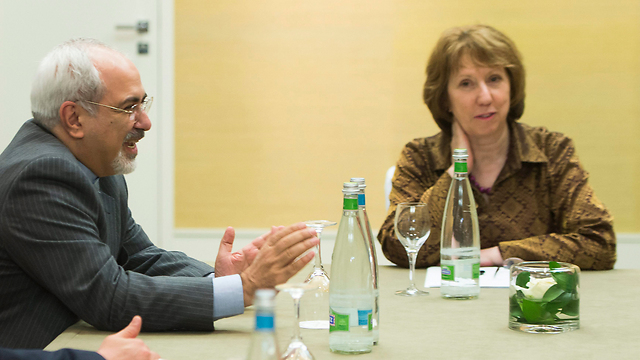
Israel slams looming deal with Iran as powers attempt last minute deal
As FMs come together in Geneva for last minute deal, Israeli official slams agreement, calling it historic mistake. Diplomats claim French objections attempt to 'up-stage' other world powers
Ministers from Iran and the major powers held a series of meetings late on Saturday in a final push to hammer out the outline of a deal that would that would freeze parts of Iran's atomic program in exchange for sanctions relief.
Related stories:
- As nuclear talks hit snag, Iran says 'It's now or never'
- Fabius: Will not accept 'sucker's deal'
- Netanyahu: Israel rejects nuclear deal with Iran
"Efforts to secure an agreement are continuing with great intensity," a Western diplomat close to the talks said.
French Foreign Minister Laurent Fabius said it was not clear the delegations would succeed in nailing down an acceptable interim deal that would begin to defuse fears of a stealthy Iranian advance towards nuclear arms capability.
However, a Western diplomat close to the negotiations said the French were trying to upstage the other powers.
"The Americans, the EU and the Iranians have been working intensively together for months on this proposal, and this is nothing more than an attempt by Fabius to insert himself into relevance late in the negotiations," the diplomat told Reuters, speaking on condition of
The Israeli offensive against the crystallizing deal between world powers and Iran continues as a senior Israeli official said Saturday night that "the agreement currently on the table is a very bad deal. Iran stops enriching (uranium) to 20% but continues to enrich to 3.5%, in all sites and without any cap on centrifuges (which number 19,000 in all).
"The Iranians are not really paying a serious price. From what we gather they are receiving a significant reduction in sanctions," the source said, naming four major conscious Iran will receive:
- Some $3 billion of oil revenues will be unfrozen.
- Reduction of sanctions on gold and petrochemicals
- Reduction of sanctions on spare parts for airplanes
- Reduction of sanctions on its auto street
According to the source "some three days ago we received an update – both from the Americans and from other sources – that they are going for an overall deal with Iran. Already then, Israel was against the deal.
"Then, over the weekend, we learnt that the deal is even worse than we had assumed, simply a massive mistake, and we lost it. (US Secretary of State John) Kerry left without a lot of food for though after a very difficult conversations with Bibi (Netanyahu).
Historical mistake
Israeli Defense Minister Moshe Ya'alon said on Saturday that a landmark deal on Iran's nuclear program under discussion with world powers is a "historical mistake."
"An agreement now, in the current conditions, is a historical mistake that will allow the bellicose regime in Tehran to pursue its dangerous nuclear program and its ambition to spread terror and to undermine regimes in the Middle East and the entire world," Yaalon said.
He urged world powers holding talks with Iran in Geneva on Saturday to be "intransigent" with the Islamic republic, in comments echoed by Justice Minister Tzipi Livni .
"There is no need to hurry to sign an agreement that will not reach its objectives, when a much more favorable agreement could be signed given the pressure Iran is under," Livni said in a statement.
The proposed agreement - seen as a first step ahead of further talks on a final deal - would see Iran freeze parts of its nuclear program for as long as six months in exchange for some relief from the sanctions battering its economy.
Diplomats from the P5+1 group, which is made up of Britain, China, France, Russia and the United States plus Germany, grappled to secure the deal at talks Saturday in Geneva.
After several meetings with fellow diplomats, Iranian Foreign Minister Mohammad Javad Zarif said there were still "disagreements" on some questions and pointed to divisions among world powers.
"There are differences of opinion within the P5+1 group," he was quoted as saying by Iranian news agency ISNA, adding that negotiations would not continue into Sunday if a deal was not reached.
"If we do not reach an agreement tonight, the talks will be resumed in the next seven or 10 days," he said.
Tough love
On Friday, Prime Minister Benjamin Netanyahu warned US Secretary of State John Kerry that he was offering Iran "the deal of the century." "This is a very bad deal. Israel utterly rejects it," Netanyahu said, vowing that Israel would not be bound by any agreement.
The tension between Israel and the US signals a tough road ahead for the twin American goals of finding a diplomatic solution for Iran's nuclear program and forging peace between Israel and the Palestinians.
It also raises the specter of a return to the uncomfortable relationship that has often characterized dealings between Obama and Netanyahu.
In surprisingly blunt comments, Kerry told Israel's Channel 2 TV on Thursday that Israel faced the possibility of international isolation and renewed violence with the Palestinians if peace efforts failed. He also said the continued settlement construction raised questions about Israel's commitment to peace.
"How can you say, 'We're planning to build in the place that will eventually be Palestine?'" Kerry said. "It sends a message that somehow perhaps you're not really serious."
Netanyahu responded the next morning ahead of a meeting with Kerry. "No amount of pressure will make me or the government of Israel compromise on the basic security and national interests of the State of Israel," the visibly agitated premier said.
Netanyahu also slammed the emerging agreement with Iran warning that Israel is "not obliged" to honor the agreement and would do "everything it needs to do to defend itself." Following a tense meeting stretching more than two hours, a planned joint appearance with Kerry and Netanyahu to the media was canceled.
White House spokeswoman Bernadette Meehan said Saturday the Obama administration was "in full agreement with the Israel on the need to prevent Iran from obtaining a nuclear weapon" and that the negotiations had that goal in mind.
But Netanyahu has said international pressure should be increased, not eased, until Iran dismantles all suspicious nuclear activities. For now, Netanyahu's options appear limited. Despite longstanding threats to carry out a military attack on Iran if necessary, it would be all but impossible to do so in the current diplomatic environment. On the Palestinian front, Netanyahu holds most of the leverage and is showing little inclination to change.
Nicholas Burns, a former senior State Department official, said that Netanyahu made an error by airing his grievances publicly.
"Prime Minister Netanyahu's public outburst was unfortunate and ill-advised," Burns, who now teaches at Harvard University's John F. Kennedy School of Government, wrote in an email. "It has gone down very badly in the US"
Reuters and AFP contributed to this report
- Receive Ynetnews updates directly to your desktop












